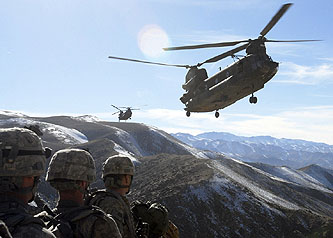 So are we really planning to leave Afghanistan in 2011? Michael Crowley rounds up some reasons to be skeptical:
So are we really planning to leave Afghanistan in 2011? Michael Crowley rounds up some reasons to be skeptical:
I wonder how many Americans who may be paying only cursory attention appreciate the thinness of Obama’s pledge to start withdrawing troops from Afghanistan in 2011. Subsequent commentary from administration officials has made this point clearer than Obama did last night.
First, there was Michèle A. Flournoy, under secretary of defense for policy, who told the New York Times this morning that “The pace, the nature and the duration of that transition are to be determined down the road by the president based on the conditions on the ground.”
Next there was Centcom commander David Petraeus….When it comes to expectations about a near-term withdrawal, he added: “Conditions-based [are] very important words that need to be focused on.”
And then there was Secretary of State Hillary Clinton….”I do not believe we have locked ourselves in to leaving,” Clinton responded, before repeating the core administration talking point: “By July 2011 there can be the beginning of a responsible transition that will of course be based on conditions.”
This was something struck me pretty starkly too. All Obama promised to do was to begin withdrawals in 2011. He didn’t say how many troops would be withdrawn, how fast they’d be withdrawn, when he expected the withdrawal to be complete, or whether he intended to keep some number of troops there forever. In other words, he really didn’t promise much of anything.
At the same time, I still think it was an important promise. Vague as it was, it set some very public expectations that we don’t plan to stay in Afghanistan forever. This is good for the Afghans, who now have a clearer incentive to take control of their own security. It’s good for the troops, who now have a specific goal and don’t feel like they’re stuck in an endless quagmire. It’s good for our allies, who might be better able to sell their own publics on the war if it’s seen as a time-limited commitment. It’s good for Muslim public opinion, since it reduces fears of a permanent American empire in the Middle East and central Asia. And for the Taliban, which already hopes to stay around forever regardless, it really doesn’t make any difference.
So it’s a positive step, setting expectations and aligning incentives in the right way. At the same time, Crowley is right: there’s a helluva lot of wiggle room in this promise, and even in the best case Obama plans to keep us in Afghanistan in force for at least four more years. Maybe longer. That’s a pretty thin promise.

















